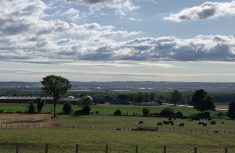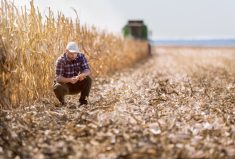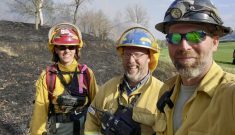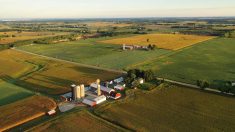I didn’t really connect with my Greig grandparents when I was young.
To my young self, they lived in a tidy house in Listowel, with a lot of breakable knickknacks, but always lots of food. We usually had to dress up to visit on a weekend. Rambunctious play was discouraged.
They came across to the little me as gruff and reserved, Scotch Presbyterian as they were. But over the years, I’ve found that their impact on the agriculture industry was significant long before I was born.
Read Also

Ontario’s agri-food sector sets sights on future with Agri-Food 2050 initiative
The first-ever Agri Food 2050, a one-day industry event dedicated to envisioning the future of food and farming in Ontario,…
Unfortunately, they both died in their early 70s and it wasn’t until about the time of their deaths that I had begun to understand them as people, and the leadership positions they had held in the agriculture sector.
Examples of the work they did in agriculture almost 70 years ago continue to find their way to me.
Jacqui Empson LaPorte, an Ontario Ministry of Agriculture, Food and Rural Affairs employee in the Clinton office, recently sent me a copy of a farewell message from Gordon Greig, my grandfather, in the February 1957 Huron Soil and Crop News. She had come across it while they were moving some boxes in the office.
Grandpa Greig was the first Ontario Federation of Agriculture fieldman in Huron County, a job he held from 1950 to 1957 while he worked the farm he purchased near Bluevale after returning from his war service.It was fascinating to read something written by my grandfather. Not too bad gramps (not that I’d ever have called him gramps). There was a bit of editing needed — and whoever laid it out managed to spell Greig incorrectly (some things never change).
The piece, which was a state-of-the-sector review, was fascinating for the challenges we no longer have to face.
There was talk of the hard work and sacrifice by farmers to get Huron County virtually free of tuberculosis and brucellosis (which he called Bang’s Disease). Grandpa Greig expressed concern that the poultry sector had not yet organized, resulting in 28 cents per dozen price for eggs. That too has changed.
He also mentioned that the number of Farm Radio Forum events was declining in Huron County and that the program, in which CBC broadcast discussions on farm topics to kitchen table meetings across the country, had been a great vehicle for moving information to farmers. He should know. His wife was at one time the president of the Farm Radio Forum.
I don’t remember how I found out during my university years that my grandmother, Vera Greig had held that role. I think it might have been during a discussion with her on a paper I had written on farm political history that she mentioned it. It was a big surprise that my quiet, and seemingly traditional grandmother had held such a position at a time when agriculture was truly a man’s world.
After grandpa had passed away, I visited grandma whenever I was in Listowel.
I didn’t learn enough from her as she died before I finished university. I’ve always regretted not learning more.
Dad says he can remember his mother going off on the train from Bluevale or Palmerston for day meetings in Toronto.
I would really love to hear her thoughts on being a woman at the head of an organization in agriculture in the 1940s or 1950s. Those weren’t the type of questions I knew to ask when I was 20.
Grandma and Grandpa Greig eventually moved off the farm, when grandpa took a job with Farm Credit. I run into farmers still who tell me how he helped them get their farming careers off the ground.
I wonder what Grandma and Grandpa Greig would think of where my career path has led me. I don’t think they were sure about the whole journalism thing. But it has allowed me to spend my career in agriculture.
The Greig family is also like most families in Canadian agriculture. My grandparents were farmers, although they eventually worked in the farm service sector. All of their three children farmed, although my dad is the only one still on a farm. Of nine grandchildren three of us work in agriculture and although two of us live on what could be called farms, our agriculture-related work is our primary occupation versus primary farming.
I like to think of my grandparents having built a foundation for farm leadership that some of us continue to build on, even though there’s a whole lot more I could have learned from them, if I had listened a little more, or known enough to ask when I was younger.





![Pictured from left to right: Zone 6 Director Crispin Colvin, Zone 14 Director Vanessa Renaud, Zone 9 Director Mark Reusser, Mary Brander, Bobby Robinson, Kyla Lewis, and Alaina MacDonald at the OFA annual general meeting in Toronto on Nov. 26, 2024. [Not pictured: Kaylee Wells].](https://static.farmtario.com/wp-content/uploads/2024/11/26215233/7937BC92-CFBB-47F5-A147-920943E02059-235x132.jpeg)








